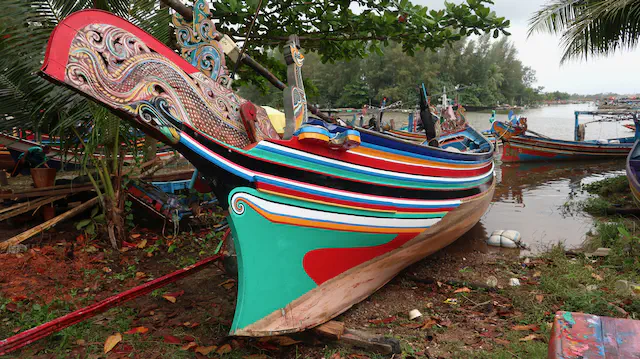Narathiwat

Meaung Narathiwat (or Menara in Pattani Melayu) is the capital of the eponymous Southern province bordering Malaysia. The town has about 40,000 inhabitants and is around 85% Melayu Muslim.
I picked this place because it was at the bottom of Thailand. In my previous two trips, I went North (Chiang Mai, Lamphun, Nan), and this time I wanted to see what was in the South. (Yala Province has the brand new Betong International Airport, but there currently aren’t any flights.)

We landed at Narathiwat Airport (NAW) in light rain. Two sets of boarding stairs pulled up, and we deplaned and walked from the parking apron across the tarmac to terminal, supplied with umbrellas.

My bicycle came back intact on the luggage carousel, and I bought an 80 baht “limousine” ticket (actually a Toyota HiAce Commuter) for the 18km ride to the Imperial Narathiwat.

After putting my bike together, I took it across the street to Ikhlas Cycle for a final tune-up to make sure it was roadworthy for the tour.

My first order of business was to ship my bike bag that I had brought on the airplane and a few things I wouldn’t need on my ride. I went to the post office, bought a box, and mailed it ahead to the hostel in Songkhla. Surprisingly, everything went smoothly and it arrived the next day.

Across the street was the excellent Narathiwat Museum. A lot of the information was in English, and I spent a few hours there. The lower level was about the history and area of Narathiwat Province, and the upper level was dedicated to the Thai Royal Family.


I saw some coin-operated washing machines last night outside a shop, and used one to wash my clothes this morning. One load was 20 baht, but the lady told me there was no dryer. It started raining heavily, so I waited most of it out in an excellent coffee shop a couple blocks away. I used Google Translate to decode find what I wanted from menu, then copied the Thai text to the order slip.

At the Rim Khuean Market ริมเขื่อนมาร์เก็ต, I met an industrial engineer named Abdul who used to live in Sydney, Australia. He seemed happy to use his English after many years. He told me about picking up a Siberian hitchhiker and dropping him off at a temple at the Malaysian border, as the traveler was solely relying on free rides and accommodation. He also met a Frenchman who was walking the world, on his way to Myanmar, Bangladesh, India, and eventually back to France.




He told me now that the troubles have subsided, there was a great demand for English, but there was no English school in the province. I asked him if there were any foreigners living here, and he mentioned a couple Africans and people from the former Soviet Union who were playing for the Nara United soccer team.
I thought monsoon season would have been over, but it’s been raining since I landed yesterday, sometimes very heavily. Both days it stopped in the mid-afternoon, so I had a chance to sightsee between showers, but it was difficult to stay dry in the sudden downpours, hopping around under shop awnings.
Many people smile and say hello to me. I haven’t seen any other Westerner here, and judging by the guestbook at the city museum, there aren’t many who make it this way.

I met a poet and musician who confessed he talked a lot and ran the Southern Coffee café next to my hotel. His wife and sister-in-law (a journalist) also talked a lot, but he said he was a glad they didn’t speak English because then we would really be in trouble.



He had shelves of books, a good collection. He wanted the shop to be a place not where customers take Instagram photos, but a community center where people talk about ideas. I asked him about local writers, and he recommended Zakariya Amataya, Thailand’s first Muslim to win the prestigious Southeast Asian Writers Award (SEA Write Award). He also showed me his own English poetry and played some music he recorded.

Many people here ask me what I think of Narathiwat and the troubles. To be honest, I don’t know a lot about the conflict, and hadn’t heard much about it other than warnings to stay away. Over the past two or three years, the number of incidents has neared zero, according to Deep South Watch. It seems that things are safe again, and that is what everyone is telling me.
There are some checkpoints, but most are unmanned. The soldiers don’t seem to be stopping anyone, and they don’t give me a second glance. Some checkpoints still have sandbags and barricades.
Beach


Boats







Test Ride
I rode out to the



In the morning, I’m hoping it won’t be raining so I can see the “300 Year-old Mosque,” which is actually more than 400 years old. I don’t think I can go inside, but it looks like it will be good from the outside too.
I’m a little sad to leave Narathiwat. Two days isn’t enough time. A lot of the interesting details are easy to overlook, and there is a quiet subtlety to the place. I am looking forward to Pattani tomorrow though, and am hoping for a good ride.
Narathiwat Food



Narathiwat City Scenes



